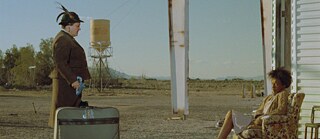Wandering and exile are journeys without purpose, without end, often imposed by fate. André Lavoie evokes this diffuse feeling of uprootedness, from which even filmmakers are not immune.
To live is to leave one place for another, one moment for the next, to detach oneself from one thought or image for the one that carries it further, ever further towards a rather ill-defined elsewhere.
Elie Wiesel
In 2023, he was back at the Cannes Film Festival with Perfect Days, a film shot entirely in Japan, centering on a character as taciturn as Harry Dean Stanton's in Paris, Texas (1984), who spends most of his time cleaning Tokyo's public toilets. Not only did actor Koji Yahusho leave the Croisette with top honors, but there was a surprising unanimity around this magnificent meditation on the passage of time and the quiet strength of routine gestures. Since good things seldom arrive alone, Paris, Texas returned to the screen this year in a restored version, to mark the 40th anniversary of this iconic 1980s film.
Obsessed as much by advertising aesthetics as post-modernism, the commercialism of promotion as the apology of the citizen of the world, the cinema of that era made wandering a favorite theme. Some even saw it as a German speciality, thanks of course to Wenders (Tokyo-Ga, Wings of Desire), but also Werner Herzog (Fitzcarraldo, The Land Where Green Ants Dream), or Percy Adlon (Bagdad Café). On the Swiss side, Alain Tanner has always been a globe-trotter of the seventh art, Europe having been his immense playground, from Ireland (Light Years Away) to Spain (The Man Who Lost His Shadow) via Portugal (In the White City).
Homeland and welcome land
Wandering and exile are journeys without purpose, without end, often imposed by fate. Even filmmakers sometimes feel uprooted from their homeland. In West Germany, this silent drama finally made itself heard on February 26, 1962: in the Oberhausen Manifesto, 26 young filmmakers, including Edgar Reitz and Alexander Kluge, declared that they did not recognize themselves in the works of their elders, hostile to "Heimat"-themed films, and called for both aesthetic and thematic revolution.In a country cut in two by the horrors of the Second World War, and previously divided by a fascist regime that used cinema as a weapon of mass persuasion, feeling cramped - or too cramped - was a constant for many artists throughout much of the twentieth century. Hence the exile of several German filmmakers to Hollywood (Fritz Lang, Joseph L. Mankiewicz), whose contribution remains remarkable to this day. What would American film noir have been without German Expressionism? Would the work of Germany's Max Ophüls (La Ronde, Lola Montès) have been less flamboyant if the strong winds of history had not taken him to France?
Who's talking and where are they talking from?
These two questions are fundamental... and rarely provide clear answers. In fact, they're questions that have plagued so-called “European” cinema since the 1950s. The deep scars left by the Second World War gradually healed, thanks to economic initiatives - in 1951, six countries, including France and the Federal Republic of Germany, signed an agreement on coal and steel - but also cultural ones. This marked the start of European film co-productions, including one between France and Italy.These alliances, necessary to rebuild an industry in tatters and assert itself in the face of American domination, gave rise to a number of reflections. Does cross-border mobility influence filmmakers' approach? Does the origin of the “majority” producer dictate the aesthetic of a filmmaker from another country? Does European cinema form a coherent whole, or is it merely an amalgam of cultural exceptions?
Volker Schlöndorff had the nerve (or carelessness) to adapt Marcel Proust's Un amour de Swann. Tom Tykwer, buoyed by the success of Run, Lola, Run, turned Patrick Süskind's German novel The Perfume, set in France, into an international co-production shot in English. Roberto Rossellini (The Taking of Power by Louis XIV) and Ettore Scola (Le Bal, The Night in Varennes), two illustrious Italian filmmakers, have also made landmark films on the history of... France. And what about Fatih Akin (Head-On, In the Fade) and Ferzan Ozpetek (His secret Life, Nuovo Olimpo): one is no less German and the other no less Italian because both are of Turkish origin.
Viewers sometimes wonder: who's talking, and depending on where the filmmaker places their camera, does he or she have the legitimacy to do so? This is most often apparent in the light of their films: some act as tourists in a hurry, others as respectful, attentive travelers, letting their approach become imbued with their doubts, without GPS imposed by a mercantile producer. We prefer the latter, because their “I” is dislocated, not disoriented...
